8 Best Anti-Aging Foods to Look Younger
By Dr. Raina N. Nahar +2 more

Get,

to manage your symptom
Get your,


4 Cr+ families
benefitted

OTP sent to 9988776655



You’ve successfully subscribed to receive
doctor-approved tips on
Whatsapp

Get ready to feel your best.

Hi There,
Download the PharmEasy App now!!


Register to Avail the Offer
Send OTPBy continuing, you agree with our Privacy Policy and Terms and Conditions

Hi There,
Sign up on PharmEasy now!!
Trusted by 4 crore+ families

OTP sent to 9988776655



You have unlocked 25% off on medicines




Code: NU25
By Dr. Raina N. Nahar +2 more
Table of Contents
Skin is often an unsung hero among the body’s organs. It is also one of the first to reflect internal imbalances. Nourishing the body with essential nutrients, such as antioxidants, healthy fats, water, vitamins, and other micronutrients, may help support the overall appearance and condition of the skin.
Since the process of skin ageing may begin internally, focusing on a nutrient rich diet is an important step. While a balanced diet is a key factor that may help support skin health over time, other aspects such as sun protection and a regular skincare routine also play a valuable role. Foods that are rich in vitamins and minerals may contribute to maintaining the skin’s natural vitality.
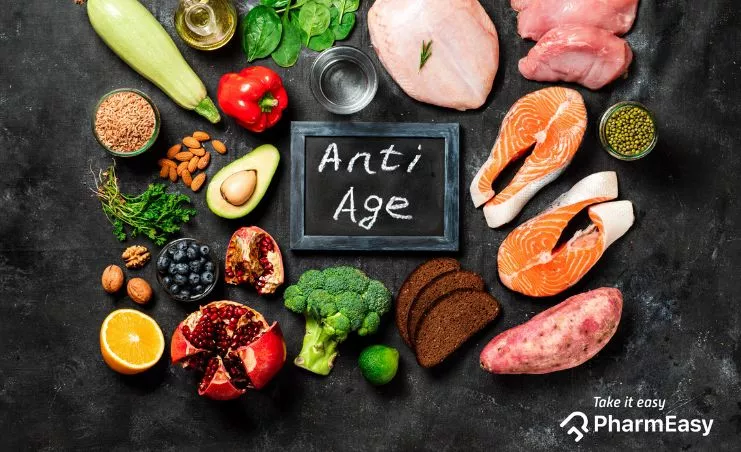
Nutrient dense foods often contain compounds like various vitamins, ellagic acid, and components that may support natural collagen levels. Collagen is present in the middle layer of the skin and plays a role in maintaining its fullness and firmness. With age, natural collagen levels may decline. However, incorporating certain foods into the diet may be beneficial in supporting skin radiance and overall glow. In particular, foods rich in vitamin C may have a positive effect on the visible signs associated with skin ageing.
Here are some foods that may be beneficial for supporting healthy looking skin and overall well-being as you age.
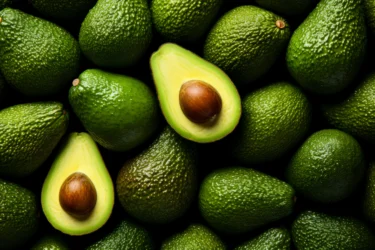
Avocados are a flavourful fruit that may provide a range of nutrients. They are a source of monounsaturated and polyunsaturated fats, which may help to nourish the skin and support moisture balance. These healthy fats may also demonstrate properties that support the body’s natural defences.
Avocados contain compounds such as lutein and zeaxanthin, which, according to some studies, may help to support the skin’s ability to cope with environmental stressors such as UV exposure. They also contain several vitamins, including A, B, C, E, and K, which may contribute to maintaining skin health and promoting a natural glow1. You can add avocados to salads or make healthy pudding with it.
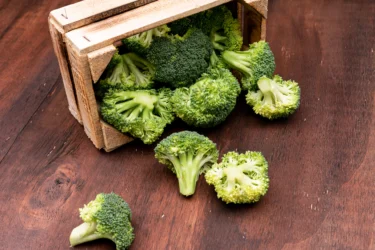
Broccoli is a nutrient-rich vegetable that may offer valuable properties for overall health. It contains a variety of compounds that may have anti-inflammatory effects and may support the body as it ages. Broccoli is a good source of vitamin C and vitamin K, both of which may help maintain skin health.
Vitamin C plays a role in the body’s natural production of collagen, which is an important component of the skin’s structure. Consuming broccoli raw or lightly steamed may help retain its nutritional value. It can be included in salads, soups, or enjoyed as a side dish. Additionally, broccoli is high in fibre and provides a source of calcium2.
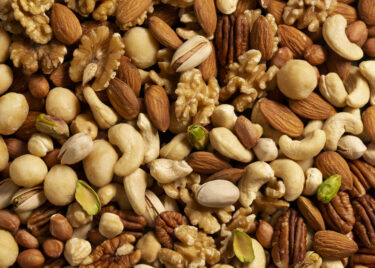
Nuts are a rich source of nutrients, including protein, vitamin E, essential oils, minerals, and antioxidants. Almonds and walnuts, in particular, contain vitamin E, which may help support the skin’s natural defences against environmental stressors such as UV exposure3. Vitamin E also helps to strengthen the skin and give a glow. You can sprinkle some nuts over salads or stir them into the soup for a little crunch.
Walnuts have the highest antioxidant content of any nut and are high in omega-3 fats. This combination may demonstrate properties that support general well-being. Additionally, walnuts may be beneficial for digestive health. Since the condition of the skin is closely associated with the balance of the gut microbiome, maintaining digestive health may help the skin function optimally, including in areas such as moisture balance and protection.
Including blueberries in your diet may be an enjoyable and simple way to support overall health. These small fruits are rich in antioxidants, particularly bioflavonoids, which may help to support the body’s natural functions. Some studies suggest that these compounds may assist in maintaining healthy circulation and may also contribute to skin health10.
Dr. Siddharth Gupta, B.A.M.S, M.D (Ayu)
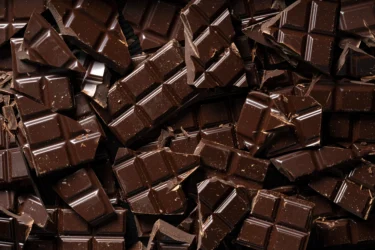
Dark chocolate, when consumed in moderation, may offer antioxidant properties that support skin health. Cocoa flavanols found in dark chocolate may help protect the skin from environmental stressors and support blood flow, which may help in skin nourishment and moisture.
Dark chocolate with at least 70% cocoa also contains magnesium, which may help with stress and sleep, which are factors that can influence the skin’s appearance. Be mindful of added sugars, as excessive sugar intake may affect skin quality4.
Citrus fruits such as oranges, grapefruits, lemons, and limes are rich in antioxidants and may be excellent choices when it comes to foods rich in vitamin C, which may contribute to reducing the visible signs of ageing.
Dr. Rajeev Singh, BAMS
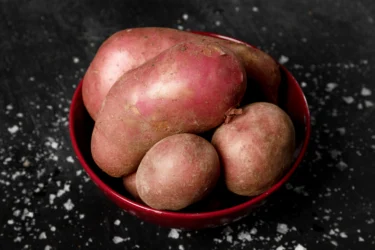
Sweet potatoes are a nutrient rich food that may benefit skin health. They are high in vitamin A, which plays a role in supporting collagen health and may help maintain skin appearance. Consuming sweet potatoes and other vitamin A rich foods may contribute to a healthy, radiant glow5.
To enjoy sweet potatoes, you can roast them with some extra virgin olive oil, salt, and pepper for a delicious and nutritious meal.
Tea and coffee might offer potential benefits for skin health. Studies12 suggest that polyphenols found in coffee and green tea may help manage photoaging (skin ageing due to sun exposure) and hyperpigmentation (darkening of the skin). However, it’s important to monitor your caffeine intake and consider your individual tolerance.
Dr. Smita Barode, B.A.M.S, M.S.
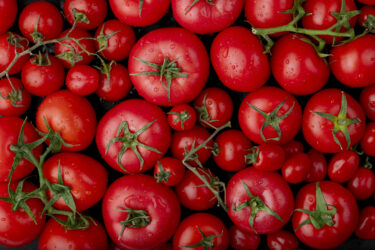
Tomato and tomato juice are rich in lycopene, a natural carotenoid that may help protect the skin from sun exposure. Cooked or processed tomatoes may offer more lycopene than raw ones, potentially enhancing their effects6.
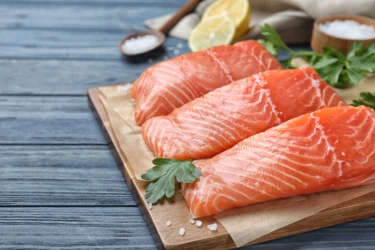
Fatty fishes such as salmon, mackerel, and tuna are rich in omega 3 fatty acids, which may support glowing skin by helping to maintain moisture levels and reduce skin inflammation. These fish are also a good source of vitamin E and zinc, which may support skin healing and help to soothe irritation.
.Foods rich in vitamin A may support skin health and contribute to maintaining the skin’s structure. Vitamin A is found in foods such as egg yolks, carrots, pumpkin, liver, and fortified cereals, which may help maintain a youthful appearance and promote healthy skin11.
Dr. Anuja Bodhare, B.A.M.S, M.D (Ayu)
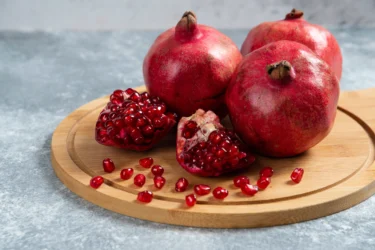
Pomegranate is considered a nutritious fruit that may offer anti-ageing properties. It may contribute to a more radiant complexion and promote overall skin health8. Incorporating pomegranate into your diet may support your well-being.
It’s also important to remember that factors like sleep, exercise, and sunscreen play a significant role in maintaining healthy skin, in addition to a balanced diet.
Also Read: 12 Proven Health Benefits Of Makhana (Fox Nuts)
This is because excessive salt intake may cause cells to lose water, which can contribute to dehydration. Inadequate hydration may affect skin appearance and is often associated with signs of ageing.
Also Read: Best Dry Fruits That Can Speed Up Your Weight Loss
Along with a healthy diet and lifestyle, it is important to follow a healthy skincare routine. Cleanser, Moisturiser, and sunscreen are important steps in skincare. You may also find it beneficial to add anti-aging serums to your skincare routine after consulting with a doctor.
Also Read: What To Eat & Avoid During Malaria?
The foods that we consume may influence the skin’s health, appearance, and how it changes with age. Diets that include foods rich in protein, healthy fats, and antioxidants may support overall skin well-being. Alongside a balanced diet that includes a variety of whole, plant-based foods, it is also helpful to adopt other supportive habits, such as wearing sunscreen, avoiding smoking, staying physically active, and using appropriate skincare products to promote healthy skin.
Disclaimer: The information provided here is for educational/awareness purposes only and is not intended to be a substitute for medical treatment by a healthcare professional and should not be relied upon to diagnose or treat any medical condition. The reader should consult a registered medical practitioner to determine the appropriateness of the information and before consuming any medication. PharmEasy does not provide any guarantee or warranty (express or implied) regarding the accuracy, adequacy, completeness, legality, reliability or usefulness of the information; and disclaims any liability arising thereof.
Comments

Leave your comment...
You may also like
Comments